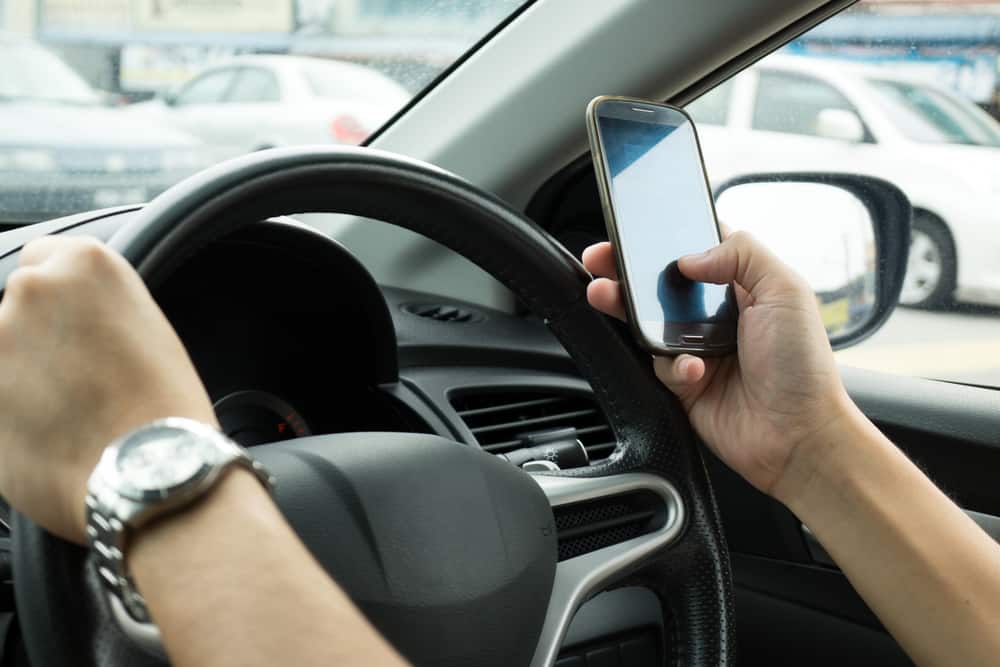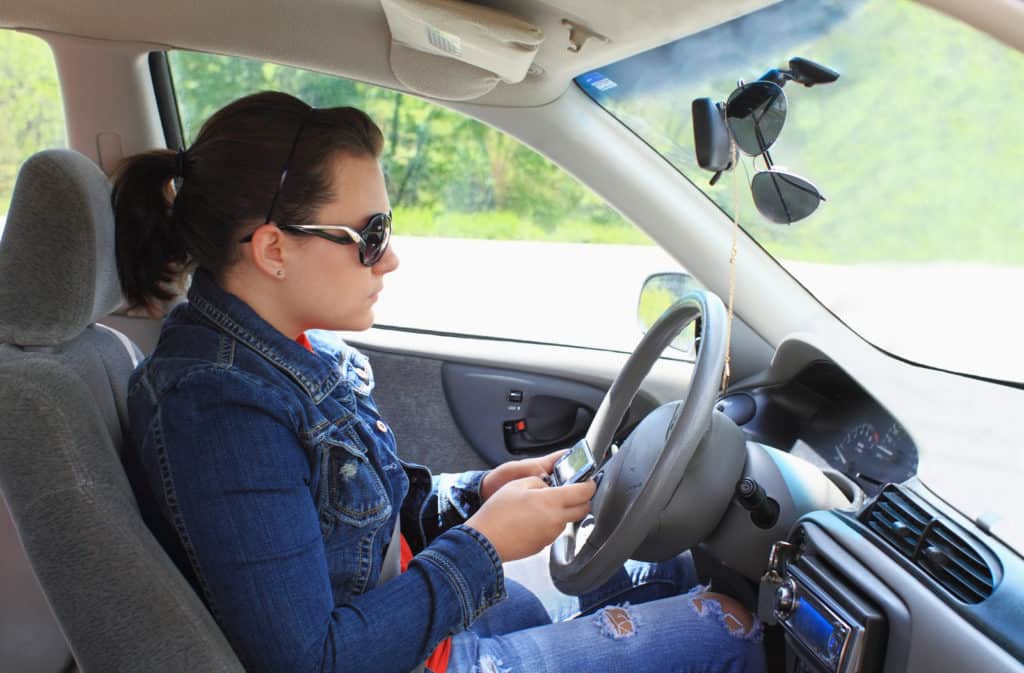Florida has enacted a law that makes texting while driving a primary offense. This change in legislation is an important milestone in the ongoing battle against distracted driving. It has a significant impact on the way law enforcement officers can enforce anti-texting laws.
Before this modification, texting while driving was considered a secondary offense. A driver could only be ticketed if pulled over for another violation, such as speeding or running a red light. However, as a primary offense, law enforcement officers can now stop and issue citations to drivers solely for texting behind the wheel, making the roads safer for everyone.
It is crucial to understand the implications of this change and how it further advances efforts to reduce distracted driving. It raises awareness of the dangers of texting while driving and highlights the legal consequences drivers may face if caught engaging in this risky behavior.
Understanding Primary Offense
To grasp the implications of Florida’s texting while driving law being a primary offense, it is crucial first to comprehend the distinction between primary and secondary offenses. A primary offense is a violation that allows law enforcement officers to stop a motorist solely based on the observed infraction. In contrast, a second offense is a violation that can only be enforced if the driver has been stopped for another primary offense.
In Florida, texting while driving is considered a primary offense. This means police officers can pull over and cite drivers if they are observed engaging in this behavior while behind the wheel without needing evidence of additional wrongdoing. This change was enacted to provide a more effective deterrent against hazardous driving practices and improve road safety.
Before the law was amended to classify texting while driving as a primary offense, it was a secondary offense. In that scenario, an officer would have had to witness another violation, such as speeding or running a red light, before being able to issue a citation for texting. This limitation made enforcement more difficult and reduced the potential impact on driver behavior.
The shift to primary offense status enhances the ability of law enforcement to address the issue by permitting officers to focus on this specific dangerous driving habit. Furthermore, it sends a clear message to drivers about the gravity of the offense and the need for undivided attention while operating a motor vehicle.
Florida’s Texting While Driving Law

Florida has implemented a strict law against texting while driving to improve road safety and reduce the number of accidents caused by distracted drivers. This law makes texting while driving a primary offense, meaning law enforcement officers can pull over and issue citations to drivers solely for texting and driving.
Origins of the Law
The law was established to respond to the alarming statistics of accidents resulting from drivers being distracted by their mobile devices. Before the new law, texting while driving was considered a secondary offense. Law enforcement officers could only issue citations if they stopped a driver for a different reason, such as speeding or running a stop sign.
This change was made to strengthen the law and allow officers to take direct action against the dangerous practice of texting while driving. The upgraded law not only deters drivers from texting while driving but also helps educate the public about the risks of this behavior.
Governor DeSantis’ Role
Florida Governor Ron DeSantis was vital in enforcing the updated texting-while-driving law. He signed the legislation into law in 2019 and has been a strong advocate for road safety in Florida ever since.
Governor DeSantis’ support for the law has brought much-needed attention to the issue of distracted driving and helped spread awareness about the dangers of texting while driving, ultimately contributing to safer roads for drivers and pedestrians in Florida.
Law Enforcement and Citations
As a primary offense, Florida’s texting while driving law grants law enforcement officers the authority to pull over and issue citations to drivers solely for using a mobile device while driving. Before this designation, officers could only issue citations for texting while driving if the driver was pulled over for a separate traffic violation.
Police officers play a crucial role in enforcing this primary offense law. They use their training and experience to identify drivers potentially texting while driving. These indicators may include erratic driving, swerving between lanes, or even the visible use of a mobile device. Once officers observe these behaviors, they can initiate a traffic stop to address the suspected texting violation.
The law has specific guidelines regarding issuing citations to ensure fairness and avoid arbitrary enforcement. These guidelines include the following:
- A first-time texting violator faces a $30 fine, plus court costs and fees, amounting to a total penalty of around $108
- Repeat offenders within five years will receive a $60 fine, plus court costs and fees, and will also receive 3 points on their driver’s license
- If the violation results in a crash, the driver will receive 6 points on their license
- Texting violations in designated school zones or active work areas receive two additional points
It is important to note that law enforcement officers must inform the stopped driver that they have the right to decline a search of their mobile device. If the officer suspects the driver of texting, they may request to see the device, but the driver can refuse without consequence. Officers may not access the driver’s phone without a warrant or consent or in the case of an emergency.
Mobile Devices and Messaging
Florida has taken a strong stance against texting while driving by making it a primary offense. This change in the law targets the use of mobile devices and their various messaging capabilities to prevent distracted driving and improve road safety. In this section, we will discuss the impact of this law on messaging, mobile devices, emails, and text messaging.
Text messaging remains one of the most common forms of communication, especially among younger generations. With the prevalence of smartphones, other forms of messaging have gained popularity, such as instant messaging apps, social media platforms, and email. The law encompasses text messaging and covers a wide range of messaging activities on mobile devices, including emailing and using messaging apps.
The primary offense classification means law enforcement officers can now pull over drivers solely for using a mobile device to send or read messages while operating a vehicle. This is a significant change from the previous secondary offense classification, where officers could only issue citations for texting while driving if the driver was pulled over for another reason.
Drivers need to understand that this law does not apply to all uses of mobile devices while driving. Specific exemptions include:
- Using a mobile device for navigation purposes
- Making a phone call
- Operating a device in hands-free mode
- Reading a message related to emergency traffic, weather alerts, or navigational information
- Reporting an emergency or criminal activity
However, the law still aims to reduce the overall use of mobile devices for messaging purposes while driving, encouraging drivers to utilize hands-free options or wait until they are not behind the wheel to engage in messaging activities.
Dangers of Distracted Driving
Distracted driving, such as texting while driving, poses a significant risk to the safety of drivers, passengers, and pedestrians. When attention is taken away from the road, the likelihood of accidents and injuries increases.
Accidents and Injuries
According to the National Highway Traffic Safety Administration (NHTSA), distracted driving was the cause of approximately 3,000 deaths and around 400,000 injuries in 2019 alone. Texting while driving is considered one of the most dangerous forms of distracted driving, as it involves taking one’s eyes off the road, hands off the wheel, and mind off the task of driving.
The following statistics highlight the dangers of texting while driving:
- Texting increases the risk of a crash by 23 times
- A text takes an average of 5 seconds to read, during which a vehicle going 55 mph travels the length of a football field
- According to a study by the Virginia Tech Transportation Institute, taking your eyes off the road for just 2 seconds doubles the risk of a crash
The injuries resulting from distracted driving accidents can range from minor to severe, with the potential for long-term disabilities and medical costs.
Fatalities
Texting while driving increases the risk of accidents and injuries and can result in fatalities. In 2019, 3,142 people lost their lives in motor vehicle crashes involving distracted drivers, according to the NHTSA.
Young drivers, in particular, are at a higher risk of being involved in fatal distracted driving accidents. They are more likely to engage in risky behaviors like texting while driving. Preventing these tragedies is a priority for lawmakers and safety organizations, so establishing texting while driving as a primary offense in Florida is a significant step in the right direction.
Fines and Violations
Florida’s texting while driving law being a primary offense means law enforcement officers can pull over and issue citations to drivers solely for texting while driving. This classification makes it a distinct moving violation, directly impacting drivers in multiple ways.
First-time offenders caught texting while driving will receive a $30 fine, which can increase with additional fees and court costs. This fine may not seem large, but it is meant to deter drivers from engaging in this dangerous behavior.
If a driver is caught texting while driving within a school zone, the fines and penalties can be more severe. There is a strong emphasis on driver safety in school zones, as these areas present an increased risk for students, parents, and school staff. As a result, fines for texting within these areas may be doubled to encourage drivers to stay focused on the road and prioritize the safety of everyone in the vicinity.
As a primary traffic offense, drivers found guilty of texting while driving will also receive points on their driver’s license. These points can lead to increased insurance premiums and, eventually, suspension of the driver’s license if they accumulate too many. This is an additional incentive for drivers to avoid texting while driving and adhere to the law.
In summary, the classification of texting while driving as a primary offense in Florida not only imposes initial fines but also brings other consequences, such as additional fees, increased penalties in school zones, and points on driver’s licenses. These measures collectively encourage safer driving practices and are designed to reduce the risks associated with texting and driving.
Other Prohibited Activities

Florida’s texting while driving law also addresses other activities that can create distractions for drivers, particularly involving wireless communication devices. These prohibitions aim to increase road safety and reduce the risk of accidents caused by multitasking behind the wheel.
Wireless communications, such as phone conversations, are discouraged while driving. Although this activity is not illegal, drivers are encouraged to use hands-free devices if they need to make or receive phone calls. This allows the driver to maintain full vehicle control and keep their eyes on the road.
Designated school crossings and zones are areas where drivers must be extra cautious. In these zones, drivers must not use cell phones, even if mounted on a hands-free device. Additionally, school bus drivers are prohibited from using wireless devices while driving, except when communicating with emergency services or when the bus is parked.
Distractions while driving come in many forms besides texting or using a cell phone. Florida law reinforces the importance of maintaining focus on the road and eliminating any activity that may distract a driver, including eating, applying makeup, or engaging in loud conversations with passengers.
In summary, Florida’s texting while driving law extends to activities related to cell phones and other distractions that could impact driver attention. The law recognizes the importance of ensuring that all drivers remain focused on the road to promote safety in school zones and other areas.
Exceptions and Allowed Use
In certain situations, using a wireless communications device while driving is permitted under Florida’s texting-while-driving law. These exceptions are designed to prevent unnecessary distractions while allowing drivers to access essential navigation and communication features required in specific scenarios.
Firstly, the law permits using a wireless device for navigating or obtaining weather alerts. This exception allows drivers to utilize GPS features on their devices and stay informed about hazardous weather conditions. However, it’s important to exercise caution while operating these features and avoid engaging in any activities that may prove distracting or unsafe.
In addition to navigation and weather alerts, the law permits using a wireless communications device during emergencies. This provision enables drivers to contact emergency services or report dangerous situations on the road. In such cases, the device must be used solely for emergencies, not routine communication.
Finally, the law makes an exception for certain professionals on duty, such as law enforcement officers and other emergency responders. These individuals may use wireless communication devices to fulfill their professional duties, as their jobs may require constant access to essential communication tools.
In summary, Florida texting while driving law allows specific exceptions for using wireless communications devices in navigation, weather alerts, emergencies, and professional duties. Drivers should be aware of these provisions and utilize their devices responsibly, avoiding unnecessary distractions while on the road.
Seeking Legal Help
Florida motorists faced with a citation for texting while driving should consider seeking the advice and representation of a qualified accident attorney. An experienced attorney can guide you on the nuances of the law and ensure that your case is handled appropriately.
Legal help is especially important if the texting while driving offense contributed to an accident or resulted in personal injury or property damage. In such cases, accident attorneys can help navigate the complexities of the legal system and strive to obtain fair compensation for their clients.
When seeking legal assistance, keep the following points in mind:
- Choose an attorney who is experienced in handling texting-while-driving cases
- Look for legal professionals who are familiar with Florida traffic laws
- Consider finding a lawyer who offers a free initial consultation to discuss your case
Contacting an accident attorney in the early stages of your case can be crucial for successfully navigating the legal process and defending your rights as a Florida motorist.
FAQS
What does it mean that Florida’s texting while driving law is a primary offense?
Law enforcement officers can stop drivers and issue citations for texting while driving. Officers don’t need another reason, such as speeding or a broken taillight, as a primary offense to pull someone over.
How does Florida’s texting-while-driving law compare to other states?
Most of the United States has laws against texting and driving. Like many other states, Florida makes texting while driving a primary offense. However, the severity of penalties and the exact definition of “texting” may vary from state to state.
What are the penalties for texting while driving in Florida?
For a first-time offense, the fine is $30 plus court fees. A second or subsequent violation within five years is considered a moving violation, with a $60 fine and three points against the driver’s license.
Can drivers use their phones for navigation or other non-texting purposes?
Yes, Florida’s law specifically targets “manually typing or entering multiple letters, numbers, symbols, or other text in the device” while driving. Using a phone for navigation or other hands-free purposes is allowed.



